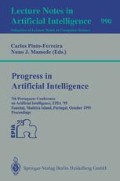Partially supported by JNICT-Portugal and ESPRIT project Compulog 2 (no. 6810).
Partially supported by the National Science Foundation grant #IRI-9313061.
Preview
Unable to display preview. Download preview PDF.
References
J. J. Alferes, C. V. Damásio, and L. M. Pereira. SLX — a top-down derivation procedure for programs with explicit negation. In M. Bruynooghe, editor, Int. Logic Programming Symposium. MIT Press, 1994.
J. J. Alferes, C. V. Damásio, and L. M. Pereira. A logic programming system for non-monotonic reasoning. Journal of Automated Reasoning, Special Issue on Implementation of NonMonotonic Reasoning(14):93–147, 1995.
J. J. Alferes. Semantics of Logic Programs with Explicit Negation. PhD thesis, Universidade Nova de Lisboa, 1993.
J. J. Alferes and L. M. Pereira. On logic program semantics with two kinds of negation. In K. Apt, editor, International Joint Conference and Symposium on Logic Programming, pages 574–588. MIT Press, 1992.
J. J. Alferes and L. M. Pereira. Belief, provability and logic programs. In C. MacNish et al., editors, Logics in AI, pages 106–121. Springer-Verlag LNAI 838, 1994. Extended version in Journal of Applied Nonclassical Logics, 5(1):31–50, 1995.
J. J. Alferes, L. M. Pereira, and T. Przymusinski. Strong and explicit negation in non-monotonic reasoning and logic programming. (in preparation), 1995.
K. Clark. Negation as failure. In H. Gallaire and J. Minker, editors, Logic and Data Bases, pages 293–322. Plenum Press, 1978.
M. Gelfond and V. Lifschitz. The stable model semantics for logic programming. In R. Kowalski and K. Bowen, editors, Proceedings of the Fifth Logic Programming Symposium, pages 1070–1080, Cambridge, Mass., 1988. Association for Logic Programming, MIT Press.
M. Gelfond and V. Lifschitz. Logic programs with classical negation. In Proceedings of the Seventh International Logic Programming Conference, Jerusalem, Israel, pages 579–597, Cambridge, Mass., 1990. Association for Logic Programming, MIT Press.
M. Gelfond, H. Przymusinska, and T. Przymusinski. On the relationship between circumscription and negation as failure. Journal of Artificial Intelligence, 38:75–94, 1989.
V. Lifschitz. Minimal belief and negation as failure. Research report, University of Texas at Austin, 1992.
J. McCarthy. Circumscription — a form of non-monotonic reasoning. Journal of Artificial Intelligence, 13:27–39, 1980.
J. Minker. On indefinite data bases and the closed world assumption. In Proc. 6-th Conference on Automated Deduction, pages 292–308, New York, 1982. Springer Verlag.
R.C. Moore. Semantic considerations on non-monotonic logic. Journal of Artificial Intelligence, 25:75–94, 1985.
W. Marek and M. Truszczynski. Non-Monotonic Logic. Springer Verlag, 1994.
L. M. Pereira and J. J. Alferes. Well founded semantics for logic programs with explicit negation. In B. Neumann, editor, European Conference on Artificial Intelligence, pages 102–106. John Wiley & Sons, 1992.
L. M. Pereira and J. J. Alferes. Contradiction: when avoidance equal removal. Part II. In R. Dyckhoff, editor, Extensions of Logic Programming, number 798 in LNAI, pages 268–281. Springer-Verlag, 1994.
L. M. Pereira, J. J. Alferes, and J. N. Aparício. Contradiction Removal within Well Founded Semantics. In A. Nerode, W. Marek, and V. S. Subrahmanian, editors, Logic Programming and NonMonotonic Reasoning, pages 105–119. MIT Press, 1991.
L. M. Pereira, J. N. Aparício, and J. J. Alferes. Non-monotonic reasoning with logic programming. Journal of Logic Programming. Special issue on Nonmonotonic reasoning, 17(2, 3 & 4):227–263, 1993.
L. M. Pereira, C. Damásio, and J. J. Alferes. Diagnosis and debugging as contradiction removal. In L. M. Pereira and A. Nerode, editors, 2nd International Workshop on Logic Programming and NonMonotonic Reasoning, pages 316–330. MIT Press, 1993.
T. C. Przymusinski. The well-founded semantics coincides with the threevalued stable semantics. Fundamenta Informaticae, 13(4):445–464, 1990.
T. C. Przymusinski. Autoepistemic logics of closed beliefs and logic programming. In A. Nerode, W. Marek, and V.S. Subrahmanian, editors, Proceedings of the First International Workshop on Logic Programming and Non-monotonic Reasoning, Washington, D.C., July 1991, pages 3–20, Cambridge, Mass., 1991. MIT Press.
T. C. Przymusinski. Stable semantics for disjunctive programs. New Generation Computing Journal, 9:401–424, 1991. (Extended abstract appeared in: Extended stable semantics for normal and disjunctive logic programs. Proceedings of the 7-th International Logic Programming Conference, Jerusalem, pages 459–477, 1990. MIT Press.).
T. C. Przymusinski. Autoepistemic logic of knowledge and beliefs. (in preparation), University of California at Riverside, 1994.
T. C. Przymusinski. A knowledge representation framework based on autoepistemic logic of minimal beliefs. In Proceedings of the Twelfth National Conference on Artificial Intelligence, AAAI-94, Seattle, Washington, August 1994, page (in print), Los Altos, CA, 1994. American Association for Artificial Intelligence, Morgan Kaufmann.
T. C. Przymusinski. Static semantics for normal and disjunctive logic programs. Annals of Mathematics and Artificial Intelligence, 1994. (in print).
R. Reiter. On closed-world data bases. In H. Gallaire and J. Minker, editors, Logic and Data Bases, pages 55–76. Plenum Press, New York, 1978.
R. Reiter. A theory of diagnosis from first principles. Artificial Intelligence, 32:57–96, 1987.
A. Rajasekar, J. Lobo, and J. Minker. Weak generalized closed world assumption. Journal of Automated Reasoning, 5:293–307, 1989.
K. Ross and R. Topor. Inferring negative information from disjunctive databases. Journal of Automated Reasoning, 4:397–424, 1988.
A. Van Gelder, K. A. Ross, and J. S. Schlipf. The well-founded semantics for general logic programs. Journal of the ACM, 1990. Preliminary abstract appeared in Seventh ACM Symposium on Principles of Database Systems, March 1988, pp. 221–230.
Author information
Authors and Affiliations
Editor information
Rights and permissions
Copyright information
© 1995 Springer-Verlag Berlin Heidelberg
About this paper
Cite this paper
Alferes, J., Pereira, L.M., Przymusinski, T.C. (1995). Belief revision in non-monotonic reasoning. In: Pinto-Ferreira, C., Mamede, N.J. (eds) Progress in Artificial Intelligence. EPIA 1995. Lecture Notes in Computer Science, vol 990. Springer, Berlin, Heidelberg. https://doi.org/10.1007/3-540-60428-6_4
Download citation
DOI: https://doi.org/10.1007/3-540-60428-6_4
Published:
Publisher Name: Springer, Berlin, Heidelberg
Print ISBN: 978-3-540-60428-0
Online ISBN: 978-3-540-45595-0
eBook Packages: Springer Book Archive

